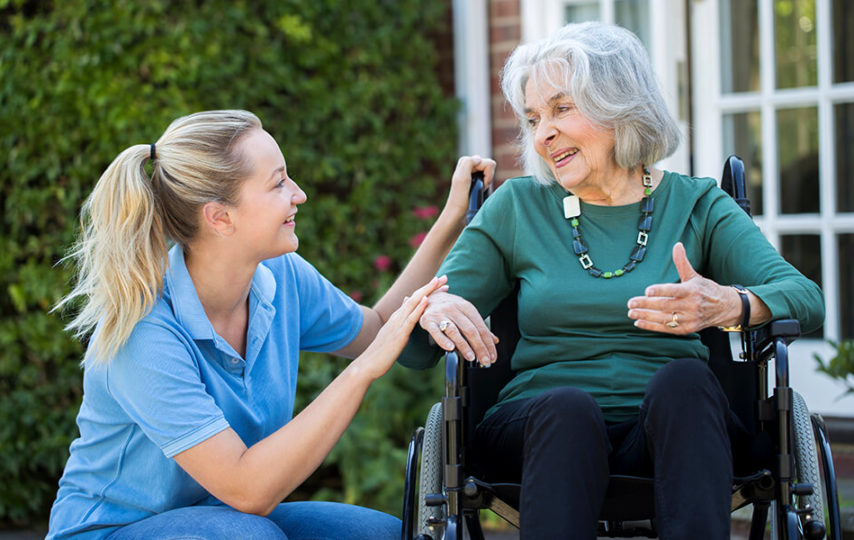As people age, many times their ability to properly provide the self-care they once easily administered to themselves is more difficult with each passing day.
Caregivers who deal with the elderly are vital to the daily success of many older individuals throughout the world. Along with this profession, there are many things that they need to know to provide the best overall care possible to their clients. When a senior remains at home or at the home of a family member with the assistance of a caregiver, it is known as in-home care.
Walking the fine line of caring for a person who needs help and making sure not to violate their dignity is an essential balance while performing the job well. Below are a few important things an Eldercare Caregiver needs to know.
Organizing Medication Properly is Key
Many elderly individuals can be on a plethora of different prescribed medications to combat varying ailments, diseases, or conditions. As an Eldercare Caregiver, you will be on the frontlines organizing their pillboxes and making sure they take their medications at the right time.
Knowing your elder, their medical history, and their medications is important when taking care of them daily. Many types of pills need to be administered at different times of the day, with or without food, with a full glass of water, or as needed. Also, watching out for the side effects that may arise and reporting them promptly to a health care provider can save someone’s life.
Keeping Your Elderly loved one Active
Exercise can play a big role in your elder’s life especially if they have experienced weight-related health issues that need to be addressed by diet and physical activity. Exercise also helps keep seniors from falling, which is the leading cause for hospitalizations in people over 65.
Four well-known types of exercises are encouraged for seniors and are considered perfectly safe. Each one of these types of exercise also has different benefits.
- Strength training using light-weighted dumbbells, and other types of free weights to curb muscle loss that is a result of older age.
- Endurance training like light jogging, brisk walking, or treadmill activities can increase blood circulation and is the key to physical wellbeing.
- Stretching can also help increase circulation but also improves joint health that deteriorates in elders.
- Balancing exercises are vital to ensure seniors minimize the risk of falling and injuring themselves.
Keep the Perimeter Safe
Nearly half of all nursing home applicants have applied due to falling-related injuries in their home or residence. Many physical factors including loss of balance, eyesight decline, and a decrease in cognitive abilities increase an elder’s chance of falling significantly.
As a caregiver to an elder, making sure you set up your senior for the best success in the vicinity where they will be navigating through is important. Make sure to:
- Turn on as many lights as you can to illuminate the walkways to and from areas of the space they will be navigating through.
- Identifying and reminding your elder to take advantage of all the guide rails and places to lean on while walking can give them peace of mind.
- Keeping an eye out and moving anything on the ground that can trip up your senior.
- Wet hardwood or tile floors can be very dangerous for those with decreased levels of balance, so keep a lookout for spills that can spell danger for older folk.
- Looking for side effects from medications like dizziness, blurry vision, or lightheadedness can keep you on the lookout for instability during different times of the day.
Supervising Movement
When an elderly person moves from the bathroom to the kitchen, or the bed to the couch is performing a type of movement called ambulation. Seniors and elders may sometimes require help when doing these daily tasks. Proper caregiver assistance at times like these can minimize the risk for elders to injure themselves.
Some seniors may even have a walker, cane, or wheelchair. In these circumstances, caregivers will need to provide extra assistance to help their elders live an easier life.
Post Medical Procedure
As a caregiver, you’ll find that elderly individuals tend to visit hospitals, specialists, and pharmacies more frequently than younger people. Things like:
- Eye exams.
- Physical therapy.
- Checkups.
- Hearing doctors.
- Surgery.
- Etc.
The period after surgery is an especially important time for elders as their older age usually gives way to longer recovery periods and more vulnerable immune systems. Caregivers need to keep an eye on their seniors at these points in time. Make sure to document and communicate any changes in mental or physical wellbeing.
Knowing all you can as their caregiver about the procedure, medications, dietary restrictions, estimated length of recovery, and more is essential information to make sure you provide the best service possible.
The Bottom Line
Elderly folks need assistance with many things that younger people take for granted. As a caregiver specializing in eldercare, knowing the most important factors in dealing with seniors can give you the advantage in setting up your elderly loved one for success.
Understanding their medication, helping them exercise, taking care of them after surgery, assisting them to move around, and freeing their walking area of any items that may trip them up are all articles of knowledge to help you provide the best service.













